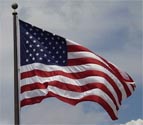US party conventions are not pure show
 US party conventions are not pure show By Peer Meinert, dpa Eds: Part of a series of stories moving prior to the Democratic convention that opens Monday; Republican convention begins September 1; epa photos available =
US party conventions are not pure show By Peer Meinert, dpa Eds: Part of a series of stories moving prior to the Democratic convention that opens Monday; Republican convention begins September 1; epa photos available =
Washington (dpa) - The ritual at US political party conventions rarely varies. They end with a cascade of balloons and the smiling candidate on stage with family and the vice presidential pick.
Whether Democrats or Republicans, the four-day political spree is an endless celebration of the parties and their traditions - brought to viewers live by prime-time television.
Even as the centre-left Democrats prepare to nominate the country's first black presidential candidate of a major party at their convention in Denver starting Monday, US commentators chided the parties for their "productions" and "public relations events" that are orchestrated for the media.
European critics look at the events with contempt, downplay their importance and dismiss them as pure show business, in which the delegates are degraded to the role of extras.
However, a closer look would show some parallels, for example, to German political party congresses, with the major difference that the interest of the large US television networks in the US conventions has waned in recent years.
Professor Julian Zelizer, a political scientist at the prestigious Princeton University, wryly noted recently that it seems the critics even revel in the chorus of lamentations about how meaningless the conventions are.
He believes that pundits nostalgic for political intrigue prefer the smoke-filled rooms of the past, where hours of horse trading and closed-door heated debate finally produced a candidate that was acceptable to the party bosses.
"However, the conventions continue to have their purpose," Zelizer stresses.
In the case of the Democrats, the convention task could hardly be more delicate. Following an extremely tough and expensive primary season, it is time to reconcile the followers of Senator Barack Obama, 47, and Hillary Clinton - and to coordinate their political messages.
It is a balancing act. In Europe in general, the balance is found through motions, debate and lots of paper. In the United States, the process gets done differently, through mediation, open discussion in the media and behind-the-scenes talks.
This means that Obama and Clinton will appear on television together, but they may also still be conducting a serious debate about their differences. Despite the chic stage management and showmanship, open conflict, including protests and demonstrations from Clinton's women supporters, cannot be ruled out in Denver.
The task will be even more difficult for centre-right Republican John McCain to establish his profile and excite his supporters and volunteers.
For McCain, the crucial question is what to do about the president? The 71-year-old senator from Arizona is at odds with the unpopular outgoing President George W Bush on many important issues. Some reckon he would rather hide Bush and Vice President Dick Cheney during the convention.
But here, too, there are political issues that will shape the convention's choreography.
Party loyalists now have more of a say about the candidates, as they cast votes for delegates in primaries or caucuses over the half year before the convention. The process is, for the most part, transparent - the result of abuses of the past.
The bloody clashes at the 1968 Democratic Party convention in Chicago helped push things that way. Then-president Lyndon Johnson had withdrawn from the Democratic race under growing massive protests against the Vietnam War. But his vice president Hubert Humphrey took up the flag and managed to push through his candidacy, even though he had not taken part in a single primary.
The nomination provoked rioting and massive police retaliation - and led to party reforms that made candidate selection more democratic and transparent.
Across Europe, candidates are often chosen behind the scenes within the party structures, US candidates have to fight it out in the open battlefield of the primaries, one of the toughest political proving grounds in the world.
The problem with this is that since most of the delegates have already committed their vote, there are virtually no surprises left for the party conventions.
In 2004 the large US television networks only devoted three hours of live broadcasting to the conventions.
But the mood of the country has shifted as the war in Iraq continues and the country perches on the brink of recession. There are also more cable channels and internet outlets vying for voter attention.
Foreign media organizations are sending 5,000 reporters to Denver, who will join 10,000 domestic journalists in covering the historic nomination of the country's first black presidential candidate. (dpa)